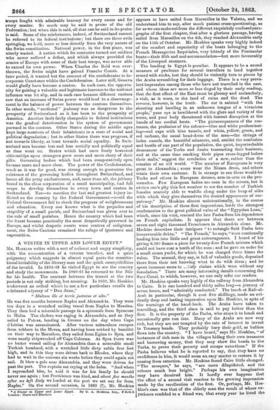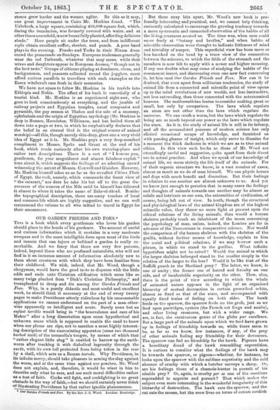A WINTER IN UPPER AND LOWER EGYPT.*
Ma. Hosxiss writes with a sort of reticent and angry simplicity, with the concentration of a veteran traveller, and a quiet poignancy which suggests in almost equal parts the constitu- tional irritability of the literary man and the quick susceptibilities of the invalid. In 1832-33 he visited Egypt to see the country and study the monuments. In 1860-61 he returned to the Nile for his health. The contrast between the transit at the two periods is not only striking, but amusing. Iu 1832, Mr. Hoskins underwent an ordeal which in not a few particulars recalls the celebrated odyssey of "Don Juan,"
".21Iultum ille et terns jactatus et alto."
He was five months between Naples and Alexandria. They were ten days in a wretched sailing vessel from Naples to Messina. They then had a miserable passage in a spironale from Syracuse to Malta. The cholera was raging in Alexandria, and so they sailed to Patras, landing in Greece on the day when Capo d'Istrias was assassinated. After various miraculous escapes from robbers in the Morea, and having been robbed by banditti on their way to Marathon, they sailed from Egina to Syra, and were nearly shipwrecked off Cape Colonna. At Syra there was no better vessel sailing for Alexandria than a miserable small Turkish bombard, with a wretched little dirty cabin four feet high, and in this they were driven back to Rhodes, where they had to wait in the convent six weeks before they could again set sail. It blew a gale near Alexandria, and they were driven far past the port. The captain sat crying at the helm. "And when I reproached him, he said it was for his family he should never see again ; but Providence was kind, and about five months after we left Italy we landed at the port we set ont for from Naples." On the second occasion, in 1860 (?), Mr. Hoskins • A Winter in Upper and Latta Bop& By G. A. Hoskins, En, F.R.0.13 London : Hurst and Blackett.
appears to have sailed from Marseilles in the Valetta, and we understand him to say, after much patient cross-questioning, as far as we can make outfrom the different exquisitely confusedpara- graphs of the first chapter, that after a glorious passage, having sailed from Marseilles on the 4th, they reached Alexandria early on the 11th of October. Mr. Hoskins speaks very highly indeed of the comfort and superiority of the boats belonging to the French Messageries Impeliales, very bitterly of the Peninsular boats—their filth and mal-accommodation—but more favourably of the Liverpool steamers.
The landing in Egypt is peculiar. It appears to be a sound measure of prudence for several travellers to land together armed with sticks, lest they should be violently torn to pieces by the Arabs scrambling for their luggage. There is a very preva- lent impression among those who have not travelled in the east, and whose ideas are more or less tinged by their early reading, that the first effect of the East must be gloomy and melancholy, a visit, as it were, to the land of ruins and the dead. The reverse, however, is the truth. The ear is saluted "with the shouting and bawling in an unknown tongue of a vivacious people," your eye is bewildered with the glare and variety of the scene, and your body threatened with instant disruption at the hands of too cordial hosts. "The picturesqueness of the cos- tumes, the profusion of the colours—blue and white predominat- ing—red caps with blue tassels, and white, yellow, green, and red turbans, the usual bead-dress of the men—the strings of laden camels, the beautiful minarets, and, amidst the confusion and bustle of one part of the population, the quiet, imperturbable demeanour of the Turks and Arabs transacting their business, and at the same time smoking their pipes cross-legged before their stalls," suggest the revelation of a new, rather than the remains of an old world. " The number of Europeans is very great in Alexandria ; some wear the Nizam dress, and others retain their own costume. It is strange to see these would-be Turks and others in European dresses, arm-in-arm on the pro- menades. Few European ladies are seen in the streets, but it excites one's pity this hot weather to see the number of Turkish. females scarcely able to waddle along under the heap of silks with which they give themselves the desired appearance of cor- pulency." Mr. Hoskins almost unintentionally, in the course of his description of these first impressions, lends the strongest confirmation to the great political value of the "Egyptian Loan," which, since his visit, rescued the late Pasha from his dependence on French capitalists. It appears that there are between seven and eight thousand Frenchmen in Alexandria alone. Mr. Hoskins describes their intrigues " to entangle Said Pasha into irrecoverable debts." " The French," he says, "were continually leading him into little and great extravagances. I heard of his giving 6,500 francs a piece for twenty-four French mirrors which could not have cost a tenth of the sum ; and he gave an order for a small steam yacht, for which he was charged three times the value. The arsenal, they say, is full of valuable goods, deposited there from their not knowing what to do with them ; and be spent immense sums to .....tisfy claims which were without any foundation." There are many interesting details concerning the Suez Canal, to which, however, we can only refer our readers.
Mr. Hoskins speaks very highly of the railway from Alexandria to Cairo. It is one hundred and thirty miles long—a journey of seven hours, and "admirably conducted." The lunch at Kafr-el- Aesh in particular, though it cost five shillings, made an evi- dently deep and lasting impression upon Mr. Hoskins, in spite of the warnings of the hand-book. The Arabs have taken to travelling, and the third class is said to pay. better than the first. It is the property of the Pasha, who stops it to lunch and occasionally gets run into. Many of the Arabs are now very rich, but they are not tempted by the rate of interest to invest in Treasury bonds. They probably bury their gold, as bullion flows into the country. " I have heard," says Mr. Hoskins, " of instances of rich men in the villages hiding their own treasures and borrowing money, that they may show the bonds to the Turks, to prove their poverty and escape extortions." If the Pasha believes what he is reported to say, that they have no confidence in him, it would seem an. easy matter to restore it by ceasing from extortion. Mr. Hoskins found Cairo little changed. " The mosques," he says, " are more dilapidated, and the colours much less bright." Perhaps his own imagination may have deceived him. It hardly ever happens that the effect of a second visit reaches to the growing impression made by the recollection of the first. Or, perhaps, Mr. Hos- kius's case was that of the elderly man the result of whose ex- perience confided to a friend was, that every year he lived the
stones grew harder and the women uglier. Be this as it may, one great improvement in Cairo Mr. Hoskins found. " The Uzbekeeh, a large square, containing 450,000 square feet, which, during the inundation, was formerly covered with water, and at other times a cornfield, is now beautifully planted, affording delicious shade." Here people sit under the trees, and from indifferent cafes obtain excellent coffee, sherbet, and punch. A poor band plays in the evening. Franks and Turks in their Nizam dress crowd the promenade on Sundays. European tradesmen generally wear the red Tarboosh, whatever that may mean, while their wives and daughters appear in European dresses, " though not in the best taste." Groups of citizens playing at dominoes, chess, and backgammon, and peasants collected round the jugglers, must afford curious parallels to travellers with such examples as the Essex witchcraft case fresh in their memories.
We have not space to follow Mr. Hoskins in his tra,;els into Ethiopia and Nubia. The effect of his book is essentially of a tourist kind. Mr. Hoskins is an experienced sight-seer, who goes to look conscientiously at everything, and the jumble of railway projects and Egyptian temples, canal companies and pyramids, the gay season at Thebes and the sale of a mummy, ophthalmia and the origin of Egyptian mythology (Mr. Hoskins is deep in Bunsen, Herodotus, Wilkinson, and has boiled them all down into a page or two, in which he emphatically declares that the belief in an eternal God is the original source of animal worship)—all this, though merely skin-deep, gives one a very vivid idea of Egypt as it is. Mr. Hoskins pays a very deep-mouthed compliment to Messrs. Speke and Grant at the end of his book, which reads curiously after his own watering-place and rather tart descriptions. There is a sort of " I honour you, gentlemen, for your magnificent and almost fabulous exploit" tone about it, which suggests the feelings of an admiring crowd witnessing the ascent of Messrs. Coxwell and Glaisher. However, Mr. Hoskins himself takes us as far as the so-called Ultima Thule of Egypt, the rock, namely, which commands the finest view of "the cataract," nor does he take his hat off to the great dis- coverers of the sources of the Nile until he himself has followed it almost to where it takes the name of Bahr-el-Abiad. Besides the topographical description, there are many touches of local and common life which are highly suggestive, and we can well recommend the volume to all who inttnd to travel in Egypt for their amusement.































 Previous page
Previous page